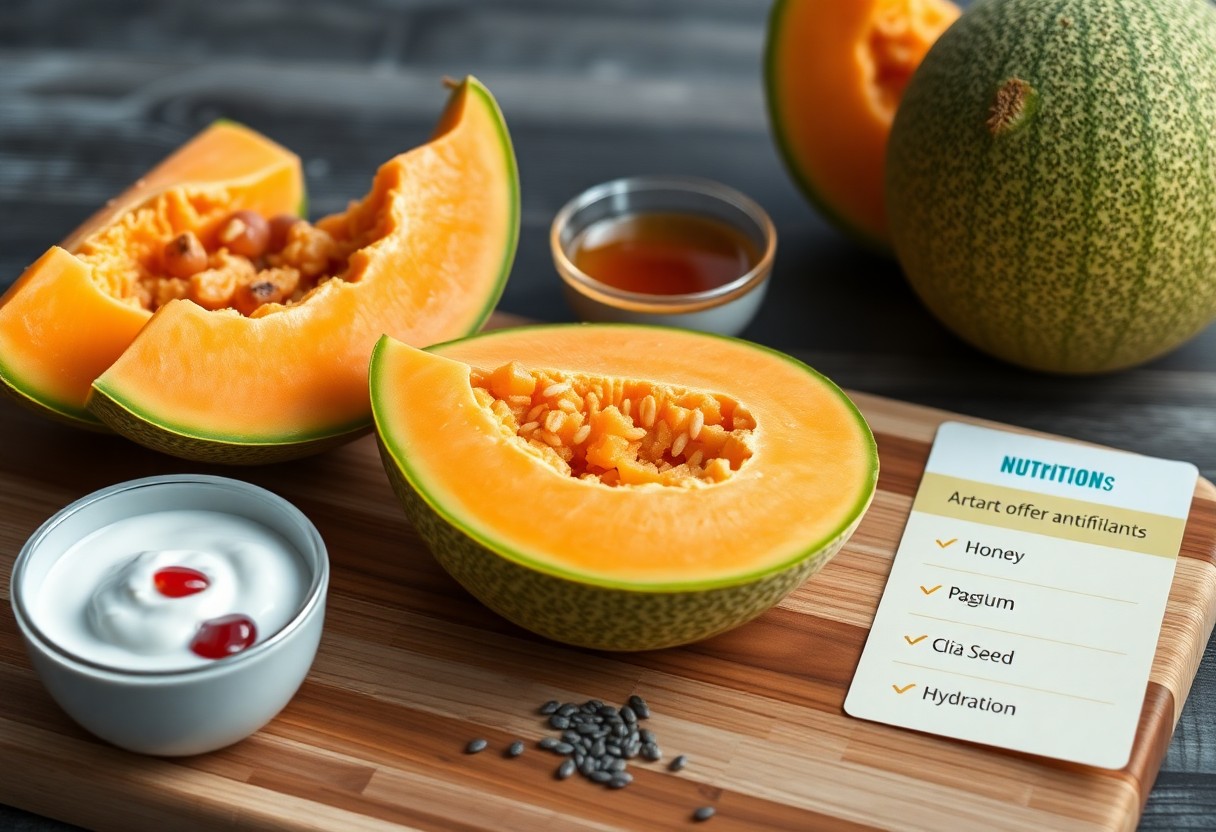It's time to explore the remarkable nutrition and health benefits of cantaloupe, a delicious and refreshing fruit that you should consider adding to your diet. Packed with vitamins, minerals, and hydration, cantaloupe supports your overall well-being while satisfying your sweet cravings. In this article, you'll discover vital nutrition facts and the myriad of ways this vibrant fruit can enhance your health, making it a perfect addition to your meals and snacks.

Key Takeaways:
- Rich in vitamins A and C, cantaloupe supports immune function and skin health.
- Low in calories and high in water content, making it a hydrating snack option.
- Contains antioxidants and dietary fiber, promoting digestive health and reducing inflammation.

Nutritional Breakdown: What’s Inside Cantaloupe?
Cantaloupe packs a variety of nutrients that contribute to overall health. With a high-water content of about 90%, it hydrates you while providing important vitamins and minerals. A single cup delivers approximately 60 calories and is rich in vitamin A, vitamin C, and potassium, making it a refreshing yet nutritious choice for your diet. Understanding these nutritional components can enhance your appreciation for this popular melon.
Macronutrient Profile: Carbs, Proteins, and Fats
This melon is primarily composed of carbohydrates, with a single cup providing around 15 grams. It contains negligible protein and virtually no fats, making it an excellent option for those seeking low-calorie, nutrient-dense foods. The natural sugars present offer a sweet taste without the heaviness of other snacks, allowing you to enjoy a guilt-free treat.
Micronutrients: Vitamins and Minerals That Matter
Cantaloupe is loaded with important vitamins and minerals that support your well-being. One cup contains about 30% of your daily vitamin C requirement and a whopping 119% of vitamin A. Additionally, potassium plays a significant role in regulating blood pressure and fluid balance, contributing to heart health. You also benefit from trace amounts of other vitamins like B6 and K, enhancing its overall nutritional value.
Each bite of cantaloupe brings a wealth of micronutrients that go beyond just hydration. The antioxidants found in vitamin C help combat oxidative stress in your body, while vitamin A supports vision and immune function. Beyond these, the potassium content helps maintain electrolyte balance, making it particularly beneficial for those active in sports or exercise routines. Consuming cantaloupe regularly can play a role in enhancing your nutrient intake and supporting a balanced diet.
The Hydration Hero: Why Cantaloupe is Essential for Hydration
Cantaloupe stands out as a hydration powerhouse, boasting a water content of about 90%. This juicy fruit not only quenches your thirst but also replenishes vital electrolytes. Incorporating cantaloupe into your meals or enjoying it as a snack can significantly contribute to your daily fluid intake. For more insight on the benefits you reap from this luscious fruit, check out What Happens to Your Body When You Eat Cantaloupe ...
Water Content and Its Impact on Health
The high water content in cantaloupe plays a vital role in maintaining your body’s hydration levels. Staying hydrated helps regulate body temperature, supports digestion, and promotes healthy skin. By including this fruit in your diet, you can help maintain optimal physiological functions that are directly influenced by adequate hydration.
Role in Promoting Kidney Function and Circulation
Cantaloupe benefits your kidneys by aiding in the efficient elimination of waste products from your body. Its high water content helps dilute urine, reducing the risk of kidney stones. Additionally, proper hydration enhances circulation, allowing vital nutrients and oxygen to efficiently reach your organs. This can lead to improved physical performance and overall health.
Maintaining hydration through foods like cantaloupe has significant implications for kidney health. By drinking enough fluids, you not only ensure your kidneys function optimally, but the nutrients in cantaloupe also help promote better blood flow, which can reduce the risk of cardiovascular issues. With antioxidants and vitamins that support blood vessel health, you enhance circulation while enjoying a delicious, refreshing fruit.
Cantaloupe and Weight Management: A Smart Snack Choice
Cantaloupe is an excellent choice for those looking to manage their weight effectively. This refreshing fruit not only satisfies your sweet tooth but also provides a healthy option that can easily fit into any diet plan. Its low-calorie profile and nutrient density make it an ideal snack that won't sabotage your goals.
Low-Calorie Density and Satiety
With only about 30 calories per cup, cantaloupe proves to be a smart, low-calorie option that keeps you feeling full. The combination of its high water content and natural sugars offers a satisfying treat without excessive calorie intake. You can enjoy a generous serving, staying nourished and fulfilled without the extra calories that come with many other snacks.
How Fiber Content Aids in Weight Control
Fiber plays a key role in weight management, and cantaloupe is a great source. Each serving provides a mix of soluble and insoluble fiber, which contributes to a feeling of fullness and helps regulate digestion. The fiber content slows down the absorption of sugar, maintaining your energy levels and curbing hunger pangs effectively.
The soluble fiber in cantaloupe forms a gel-like substance in your digestive tract, which aids in slowing gastric emptying. This means your body takes longer to digest the fruit, prolonging satiety and reducing overall calorie consumption. Additionally, fiber contributes to gut health, promoting beneficial bacteria that can support weight management efforts. Including cantaloupe in your diet can help you feel more satisfied throughout the day while supporting your overall wellness journey.
Antioxidants and Disease Prevention: Cantaloupe’s Protective Properties
Cantaloupe is rich in antioxidants, making it a valuable ally in disease prevention. The combination of vitamins A and C, along with other phytochemicals, helps combat oxidative stress in your body, which can lower your risk of chronic diseases. Studies have shown that regular consumption of antioxidant-rich foods, like cantaloupe, can enhance your body’s defenses against illness. For further insight on this, check out Cantaloupe: Health Benefits and Nutrition.
The Role of Vitamin C and Beta-Carotene
Vitamin C and beta-carotene are two potent antioxidants found in cantaloupe that significantly contribute to your health. Vitamin C plays a key role in collagen production, immune function, and may reduce inflammation, while beta-carotene converts to vitamin A, crucial for vision and skin health. These nutrients work synergistically to protect your cells from damage caused by free radicals, enhancing overall well-being.
Potential Effects on Chronic Illnesses such as Heart Disease and Cancer
Regularly including cantaloupe in your diet may help lower the risk of chronic illnesses such as heart disease and cancer. The antioxidants found in cantaloupe support the cardiovascular system by improving blood pressure and cholesterol levels. Further, compounds like lycopene and beta-carotene are linked to a reduced risk of certain cancers due to their ability to prevent cellular damage.
Evidence suggests that diets high in fruits and vegetables, particularly those rich in carotenoids like cantaloupe, correlate with lower incidences of heart disease and specific types of cancer. For instance, research indicates that high levels of beta-carotene may protect against lung and prostate cancer. Moreover, the anti-inflammatory properties of these antioxidants contribute to heart health by reducing arterial inflammation and improving blood flow. Incorporating cantaloupe into your meals not only adds flavor but also fortifies defenses against serious health issues.
Practical Ways to Incorporate Cantaloupe into Your Daily Diet
Integrating cantaloupe into your daily diet is simple and delicious. You can enjoy it as a refreshing snack, blend it into smoothies, or toss it in salads for added sweetness and hydration. Try pairing cantaloupe with prosciutto for a savory twist, or freeze chunks to create a sorbet-like treat. To explore more about its numerous benefits, check out Cantaloupe: Health benefits and nutrition.
Creative Recipes and Serving Suggestions
Enhancing your meals with cantaloupe can be both fun and flavorful. Consider making a cantaloupe salad with mint and lime dressing for a refreshing side, or blend cantaloupe with yogurt and honey for a creamy, nutritious breakfast. For a unique appetizer, serve cantaloupe cubes drizzled with balsamic glaze. These dishes not only highlight cantaloupe’s sweet and juicy profile but also provide imperative nutrients.
Tips for Selection, Storage, and Preparation
Select ripe cantaloupe by looking for a uniform, beige color and a sweet aroma near the stem. Store it in the refrigerator to maintain freshness, and consume within a few days of cutting. For preparation, wash the exterior thoroughly before slicing, and consider keeping the seeds for roasting as a nutritious snack. This ensures you enjoy all aspects of your cantaloupe.
- Choose cantaloupes that feel heavy for their size, indicating juiciness.
- Refrigerate peeled or cut cantaloupe to prolong freshness.
- This will help maintain its flavor and nutritional quality.
When storing cantaloupe, remember that whole fruits can be left at room temperature until ripe. After cutting, cover slices with plastic wrap or transfer them to airtight containers for refrigeration. Whole cantaloupes generally keep for about a week on the counter or longer in the fridge. This simple approach can enhance your meal prep and prevent waste.
- Look for cantaloupe with minimal blemishes and a firm exterior.
- Keep sliced cantaloupe in the refrigerator for easy access as a healthy snack.
- This will help maximize your enjoyment and reduce spoilage.
Conclusion
From above, you can see that incorporating cantaloupe into your diet offers numerous nutritional benefits. This hydrating fruit is rich in vitamins A and C, potassium, and antioxidants, which can support your immune system, promote skin health, and aid in hydration. By adding cantaloupe to your meals or snacks, you not only enhance your overall nutrition but also enjoy a delicious and refreshing flavor. Make this nutritious fruit a part of your healthy eating habits for better wellness.
FAQ
Q: What are the main nutrients found in cantaloupe?
A: Cantaloupe is rich in vitamins A and C, providing about 100% of the daily value in one cup. It also contains potassium, fiber, and smaller amounts of several B vitamins.
Q: How many calories are in a serving of cantaloupe?
A: One cup of diced cantaloupe contains approximately 53 calories, making it a low-calorie fruit option.
Q: What health benefits does cantaloupe offer?
A: Cantaloupe supports hydration due to its high water content, aids in digestion with its fiber, boosts immune function with vitamins A and C, and may promote healthy skin and vision.
Q: Can cantaloupe help with weight loss?
A: Yes, its low-calorie count, high water content, and fiber content can help you feel full longer, making it a great snack for weight management.
Q: How can I include cantaloupe in my diet?
A: Cantaloupe can be enjoyed fresh, added to fruit salads, blended into smoothies, or used in salsas for a refreshing twist.

0 Comments